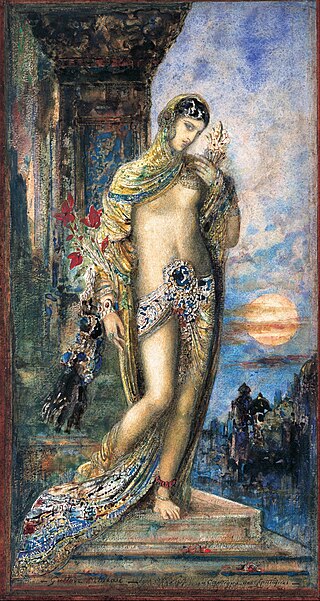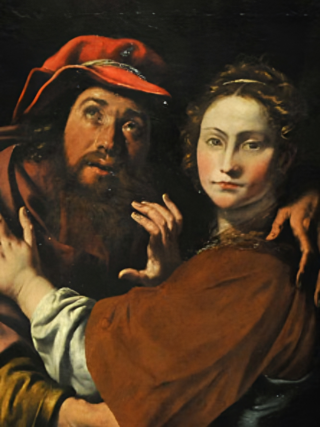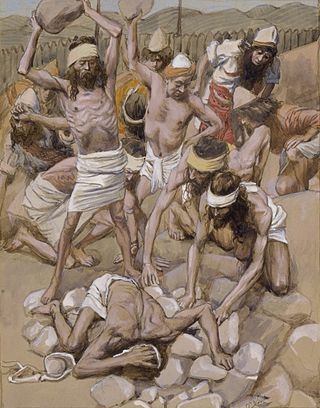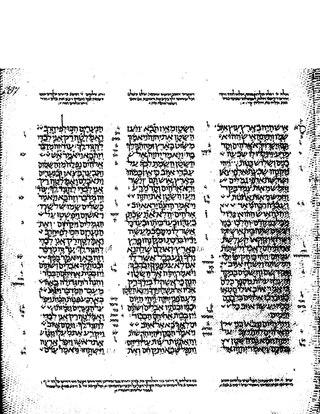
Job's wife is an unnamed biblical figure mentioned in the Book of Job.

Job's wife is an unnamed biblical figure mentioned in the Book of Job.
Job's wife appears only in chapter 2, when Job is afflicted with sores. She says to him in verse 9, "Do you still hold fast your integrity? Curse God and die" (ESV). The word translated "curse" actually means "bless", but almost all English translations view it as a euphemism. [1]
Job then rebukes his wife in verse 10, and says to her, "You speak as one of the foolish women would speak."
Job's wife is never heard of again, except for passing mentions in 19:17 (when Job says, "My breath is strange to my wife") and 31:10 ("then let my wife grind for another"). In chapter 42, Job gets more children (verse 13) but there is no mention of whether it is with the same wife or a different one.

In the apocryphal Testament of Job , Job's wife occupies a more prominent role and is given the name Sitis. [2] The children born at the end of Job's suffering are to a different wife, who is identified as Dinah, daughter of Jacob. [3]
Job's wife is usually viewed negatively. [4] S. G. De Graaf argues that she ridiculed Job "because he continued to trust in the Lord". [5] Abraham Kuyper even suggests that she is Job's last trial: "Satan knew he could use her as an instrument with which to grieve and torture his victim, and for that reason he permitted her to live." [6] Other commentators point to the fact that she, too, lost her children. Ilana Pardes appeals to 19:17 in saying that "she too, after all, is a victim of these divine tests in addition to being pained by exposure to his afflictions". [7]
Some scholars view Job's wife positively. Pardes says, "Much like Eve, Job’s wife spurs her husband to doubt God’s use of divine powers. In doing so she does him much good, for this turns out to be the royal road to deepening one’s knowledge, to opening one’s eyes." She also notes that Job "comes close to doing what his wife had suggested." [7] Carol A. Newsom calls the words of Job's wife "radical and provocative" and notes the ambiguity in the word "integrity": she could be suggesting that Job's righteousness has not done him much good so far, or she could be suggesting that Job continues in his honesty even to the point of cursing God. Newsom concludes that "Job's wife is the prototypical woman on the margin, whose iconoclastic words provoke defensive condemnation but whose insight serves as an irritant that undermines old complacencies." [8]

Abigail was an Israelite woman in the Hebrew Bible married to Nabal; she married the future King David after Nabal's death. Abigail was David's third wife, after Ahinoam and Saul's daughter, Michal, whom Saul later married to Palti, son of Laish, when David went into hiding.

The Book of Esther, also known in Hebrew as "the Scroll", is a book in the third section of the Hebrew Bible. It is one of the five Scrolls in the Hebrew Bible and later became part of the Christian Old Testament. The book relates the story of a Jewish woman in Persia, born as Hadassah but known as Esther, who becomes queen of Persia and thwarts a genocide of her people.

The Book of Job, or simply Job, is a book found in the Ketuvim ("Writings") section of the Hebrew Bible (Tanakh) and the first of the Poetic Books in the Old Testament of the Christian Bible. Scholars generally agree that it was written between the 7th and 4th centuries BCE. It addresses theodicy through the experiences of the eponymous protagonist. Job is a wealthy and God-fearing man with a comfortable life and a large family. God asks Satan for his opinion of Job's piety. When Satan's states that Job would turn away from God if he were rendered penniless, without his family, and materially uncomfortable, God allows him to do so to prove Satan wrong.

The Song of Songs, also called the Canticle of Canticles or the Song of Solomon, is an erotic poem, one of the five megillot ('scrolls') in the Ketuvim ('writings'), the last section of the Tanakh. It is unique within the Hebrew Bible: it shows no interest in Law or Covenant or the God of Israel, nor does it teach or explore wisdom like Proverbs or Ecclesiastes ; instead, it celebrates sexual love, giving "the voices of two lovers, praising each other, yearning for each other, proffering invitations to enjoy".

Zipporah, or Tzipora, is mentioned in the Book of Exodus as the wife of Moses, and the daughter of Reuel/Jethro, the priest and prince of Midian.

Divine retribution is supernatural punishment of a person, a group of people, or everyone by a deity in response to some action. Many cultures have a story about how a deity exacted punishment upon previous inhabitants of their land, causing their doom.

Hannah is one of the wives of Elkanah mentioned in the First Book of Samuel. According to the Hebrew Bible she was the mother of Samuel.

In the Book of Genesis, Dinah was the seventh child and only daughter of Leah and Jacob. The episode of her violation by Shechem, son of a Canaanite or Hivite prince, and the subsequent vengeance of her brothers Simeon and Levi, commonly referred to as the rape of Dinah, is told in Genesis 34.

Job is the central figure of the Book of Job in the Bible. In rabbinical literature, Job is called one of the prophets of the Gentiles. In Islam, Job is also considered a prophet.

Luke 1 is the first chapter of the Gospel of Luke in the New Testament of the Christian Bible. With 80 verses, it is one of the longest chapters in the New Testament. This chapter describes the birth of John the Baptist and the events leading up to the birth of Jesus. Two canticles, the canticle of Mary and the canticle of Zechariah, are both contained within this chapter. The unnamed author of Luke names its recipient, Theophilus, who is most likely a real person, but the term could simply mean a fellow believer, since theophilus is Greek for God lover. Early Christian tradition uniformly affirms that Luke composed this Gospel as well as the Acts of the Apostles, the companion volume to Luke, which is addressed to Theophilus in the same way. The title "The Gospel of Luke", found in many Bibles and some manuscripts, was added later with no indication that it was originally part of the text.
Pardes (פרד"ס) is a Kabbalistic theory of Biblical exegesis first advanced by Moses de León. The term, sometimes also rendered PaRDeS, is an Hebrew abbreviation formed from the initials of the following four approaches:

Women in the Bible are wives, mothers and daughters, servants, slaves and prostitutes. As both victors and victims, some women in the Bible change the course of important events while others are powerless to affect even their own destinies. The majority of women in the Bible are anonymous and unnamed. Individual portraits of various women in the Bible show women in a variety of roles. The New Testament refers to a number of women in Jesus' inner circle, and he is generally seen by scholars as dealing with women with respect and even equality.
Pardes is the subject of a Jewish aggadah ("legend") about four rabbis of the Mishnaic period who visited the pardes, only one of whom succeeded in leaving the pardes unharmed.

The roles of women in Christianity have varied since its founding. Women have played important roles in Christianity especially in marriage and in formal ministry positions within certain Christian denominations, and parachurch organizations. In 2016, it was estimated that 52–53 percent of the world's Christian population aged 20 years and over was female, with this figure falling to 51.6 percent in 2020. The Pew Research Center studied the effects of gender on religiosity throughout the world, finding that Christian women in 53 countries are generally more religious than Christian men, while Christians of both genders in African countries are equally likely to regularly attend services.
In the Hebrew Bible, the ordeal of the bitter water was an Israelite religion trial by ordeal administered by a priest in a duly established temple court to a wife whose lawful husband, as applicant to the court, suspected his wife's pregnancy of being the product of adultery, but the husband had no witnesses to launch a case of adultery either against a male perpetrator who impregnated his wife if she was a victim of rape though she herself is not impure of the guilt of adultery, or against both the wife and the perpetrator if she participated willingly. The ordeal is described in the Book of Numbers.

Rachel was a Biblical figure, the favorite of Jacob's two wives, and the mother of Joseph and Benjamin, two of the twelve progenitors of the tribes of Israel. Rachel's father was Laban. Her older sister was Leah, Jacob's first wife. Her aunt Rebecca was Jacob's mother.

The Hebrew Bible and the New Testament both contain narratives, poems, and instructions which describe, encourage, command, condemn, reward, punish and regulate violent actions by God, individuals, groups, governments, and nation-states. Among the violent acts included are war, human sacrifice, animal sacrifice, murder, rape, genocide, and criminal punishment. The texts have a history of interpretation within the Abrahamic religions and Western culture that includes both justification of and opposition to acts of violence.
The Hebrew Bible contains a number of references to rape and other forms of sexual violence, both in the Law of Moses, its historical narratives and its prophetic poetry.

Capital punishment in the Bible refers to instances in the Bible where death is called for as a punishment and also instances where it is proscribed or prohibited. A case against capital punishment can be made from John 8, where Jesus speaks words that can be construed as condemning the practice. There are however many more Bible verses that command and condone capital punishment, and examples of it being carried out. Sins that were punishable by death include homicide, striking one's parents, kidnapping, cursing one's parents, witchcraft and divination, bestiality, worshiping other gods, violating the Sabbath, child sacrifice, adultery, incest, and male homosexual intercourse.

Job 2 is the second chapter of the Book of Job in the Hebrew Bible or the Old Testament of the Christian Bible. The book is anonymous; most scholars believe it was written around 6th century BCE. This chapter belongs to the prologue of the book,comprising Job 1:1–2:13.